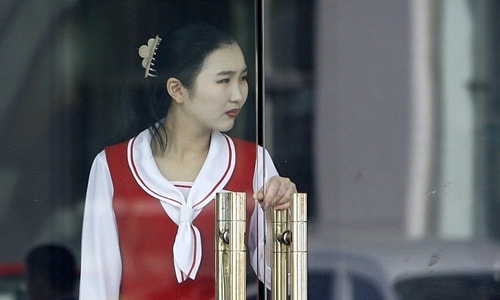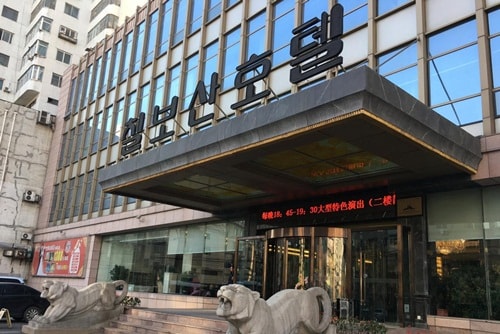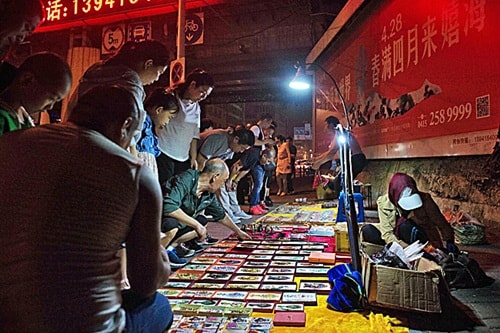China begins to support sanctions on North Korean businesses
Some have agreed to close, while others have persisted with their work as the ban on North Korean businesses in China comes into effect.
|
A female waitress at a North Korean restaurant in Dandong, China. Photo:AFP. |
Many North Korean-owned businesses in China have closed, but others have struggled to stay open, despite a ban imposed by Beijing under UN sanctions aimed at choking off Pyongyang's cash flow.AFPreport
On January 9, as the ban on North Korean businesses in China took effect, a North Korean hotel in the northeastern Chinese city of Shenyang stopped taking reservations. In Beijing, a North Korean restaurant posted a handwritten notice on its door: “Closed today.”
These are the first signs of China's support for a series of harsh United Nations sanctions imposed on North Korea over its nuclear and missile programs.
However, the implementation of the ban on North Korean businesses in China has been inconsistent, according to observers. Pyongyang has long been a close ally and relies on Beijing for 90% of its foreign trade.
In the frigid northeast, the center of North Korea's economic activity in China, some restaurants, travel agencies and seafood shops are sticking to plans to stay open.
“Tourism is about connecting people. It’s a human right,” said Kim Yongil, an employee at the North Korean International Tourism Agency in Dandong, a Chinese border city, adding that his agency had not received any notice of closure.
"Preventing people from freely visiting North Korea is a human rights issue. You are evil," Mr. Kim said.
In a basement stall across from Chinese customs, North Korean Meng Qingshu has no plans to stop selling either. His wares include dried pollock, which sells for $10 a bag, and sea cucumbers, which sell for $100 a bag.
“We sell seafood from North Korea,” she advertised. “It’s all natural.”
Imports of seafood from North Korea into China have been banned since August last year due to sanctions, but Meng still has goods to sell and she has not explained how she imports them.
Nghị quyết của Liên Hợp Quốc về đóng cửa các liên doanh và thực thể hợp tác với Triều Tiên không quy định ngày cụ thể nhưng đã đưa ra một lịch trình thực hiện kéo dài 120 ngày kể từ tháng 9/2017. Thời hạn đã đến song Trung Quốc dường như đang thực hiện nó rất chậm chạp, giới chuyên gia nhận định.
"9/1 là ngày quan trọng, ngày cuối cùng để các doanh nghiệp Triều Tiên tách ra và họ nên đóng cửa", ông Lu Chao, giám đốc Viện Nghiên cứu Biên giới thuộc Học viên Khoa học Xã hội Liêu Ninh, Trung Quốc, nói.
Người phát ngôn Bộ Ngoại giao Trung Quốc Lục Khảng trong khi đó khẳng định Bắc Kinh sẽ tuân thủ mọi nghĩa vụ đối với Liên Hợp Quốc, đồng thời "trừng trị nghiêm khắc" bất kỳ ai vi phạm các lệnh trừng phạt.
Tác động lớn
|
Khách sạn Chilbosan. Ảnh: Reuters. |
Khách sạn 14 tầng với 154 phòng Chilbosan tại trung tâm thành phố Thẩm Dương, thủ phủ tỉnh Liêu Ninh, lâu nay vẫn đóng vai trò là một nguồn thu chính cho Bình Nhưỡng. Nhưng hôm 9/1, quầy lễ tân khách sạn cho biết họ không nhận đặt thêm phòng.
"Chúng tôi đóng cửa trong thời gian này... Kể từ hôm nay", cô nói vớiAFP. Người phụ nữ cho hay cô không biết lý do vì sao.
Một ngày trước, những người Triều Tiên đeo huy hiệu quốc kỳ trên ngực vẫn thoải mái thưởng thức bữa sáng tự chọn tại đây. Khách ở Chilbosan còn có thể xem các kênh truyền hình nhà nước Triều Tiên từ tivi trong phòng riêng.
"The Shenyang Chilbosan Hotel is North Korea's largest investment in China and overseas," said Lu Chao. "They have invested between $25 million and $30 million."
Pyongyang operates the Chilbosan Hotel in a joint venture with Dandong Hongxiang Industrial Machinery Company, which once accounted for a fifth of China’s trade with North Korea, according to US officials. In 2016, Washington imposed sanctions on the company and brought criminal charges against its owner, Ma Xiaohong, for alleged links to North Korea’s weapons program.
The Hongxiang office, located on the 16th floor of a tower on the banks of the Yalu River overlooking the North Korean city of Sinuiju, has been empty since Jan. 9. Near the Friendship Bridge that spans the border, the Hongxiang branch operates a large restaurant called Pyongyang, a joint venture with the Korean People’s Insurance Association. Business records show that the insurance association transferred its stake to another company in November, but its affiliated facilities have been “temporarily” closed.
“We are closed for renovations,” said a man in the restaurant. Next door, the Hongxiang travel agency, which organizes tours to North Korea, was “silent.”
|
Stalls selling North Korean goods on the roadside in Dandong city. Photo:AFP. |
Also in Dandong, the North Korean restaurant Koryo is closed, its sign removed. A police officer stands inside. But at the Songtao Garden restaurant, which serves North Korean beer and seafood, staff are still working as usual. Songtao operated as a joint venture with a North Korean state-owned company until November 2017. The North Korean company then transferred all its shares to another partner.
According to Chung Young-June, a scholar at the Institute of Sinology at Yonsei University in South Korea, nearly 100 North Korean food businesses in China bring in about $10 million a year.
“They provide a source of income for North Korean leader Kim Jong-un,” Chung said. Closing the restaurant would have “a huge and negative impact on the North Korean leadership.”



